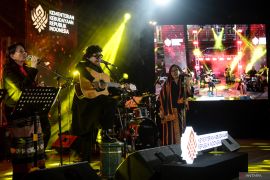Jakarta (Antara Bali) - The mode of prostitution involving a number of artistes is not because of economic necessity but rather caused by the lavish lifestyle needs.
Prostitution has been an issue for years not only in Indonesia but across the world. While prostitution is illegal in most countries, it is legal and well-established in some.
Numerous publications and most forms of entertainment today, emphasizing on sex appeal as prevalent in every area of life, greatly adds to this immoral institution.
Most women join prostitution due to an addiction to drugs, while some are forced into it by their providers, who are known as pimps.
However, young teen prostitutes enter this lifestyle as an escape and later find themselves trapped in a life they do not want to continue living.
The rampancy of prostitution cannot solely be attributed to economic problems but to leading a luxurious lifestyle as well, Social Affairs Minister Khofifah Indar Parawansa has pointed out.
"I am not referring to a particular profession, but seen from the rate of prostitution that reaches tens of millions of rupiah in a short period of time, such an activity is not attributed to economic necessity but a lifestyle," Parawansa said after closing a seminar on World AIDS Day at the Ministry of Social Training Center on December 16 last year.
Lifestyle that demands a lot of material has a tendency towards the consumerism, according to her.
"High class prostitution is certainly not because of an economic problem but a lifestyle. If the level of consumerism is high, it is likely that the demand is also very high, and the fulfillment of the demand must be met," the minister remarked.
Prostitutes did not necessarily enter this profession because of debt or poverty, but were drawn by a supposedly luxurious or glamorous lifestyle, the minister added.
Many believed it was a kind of freedom to have, but several others felt trapped in a lifestyle they wanted no part of and had begged for a different life.
With the risk of being raped, beaten, robbed, or infected, women also chose this as their profession to support their drug addiction habits or for the measly income it provided.
Although many claimed it was a personal choice, numerous prostitutes described their services as slavery because they were controlled and paid for.
Prostitution was a social problem that needed the involvement of all parties to resolve it, according to Minister Parawansa.
"Within the system of prostitution, there is slavery. With or without certification, you can find exploitation, criminalization, human and even child trafficking there," Parawansa noted.
Numerous efforts are being made to make Indonesia free from prostitution by 2019 through the Prostitution-Free National Movement launched in 2015.
Prostitution is most visibly manifested at brothel complexes, and has been managed thus far as per local government regulations across the country.
But in the Papua provincial city of Jayapura, the social affairs minister launched the Prostitution-Free National Movement in August 2015, in a bid to free the country from prostitution by 2019.
The minister launched the movement in Jayapura after the district government officially shut down the Tanjung Elmo red light area in East Sentani for good on August 17, last year.
Following the closure of Tanjung Elmo, some 69 commercial sex workers were sent back to their respective hometowns.
But the sex workers were not sent back empty handed. Each of them received a stipend of Rp5 million from the Ministry of Social Affairs and Rp5 million from the Jayapura district government.
"We hope that the former commercial sex workers, who returned to their respective hometowns, can get decent jobs. A business group could also be urged to help those affected by the closure of the local brothels," Parawansa stated.
Of the 166 cities across the country where there is prostitution, brothels in 33 cities, including Jayapura, had been closed, she noted.
His administration had officially launched a bid to make the district prostitution-free and child-friendly by 2019, Jayapura District Head Mathius Awoitauw remarked at the time.
"The transformation of Jayapura into a prostitution-free and child-friendly district reflects the concern and attention of the government for the local community," Awoitauw noted.
Further, Jayapura had declared itself a child-friendly district in 2014, and in 2015 it became prostitution-free through the closure of the Tanjung Elmo area.
In the long run, brothels in the other cities will also be closed, and if that happens, Indonesia is expected to be free from prostitution by 2019.
In an effort to free Indonesia from prostitution, many red light districts, including the notorious Gang Dolly in Surabaya, one of the largest in Southeast Asia, have been closed.
Mayor of Surabaya Tri Rismaharini had shut down the Gang Dolly red light district in June 2014, and sent back sex workers to their respective hometowns to start a new life.
Gang Dolly had been operational as a brothel complex since 1967 when a prostitute named Dolly Khavit opened the first brothel there under the governments localization scheme to centralize prostitution in Surabaya, but historical information indicates that the area had been a red light district since the Dutch colonial era.
After almost four years of posturing and threats from both local and regional government officials in East Java, the forced closure of Southeast Asias largest red light district was finally accomplished on June 18, 2014, as police moved in to secure the area despite virulent opposition from local sex workers, pimps and other residents whose livelihoods were dependent on the areas bustling sex trade.
(WDY)









